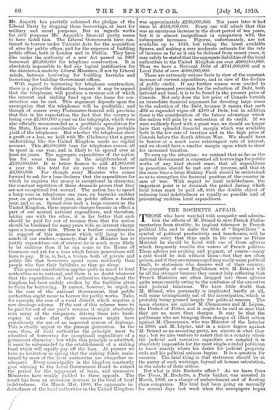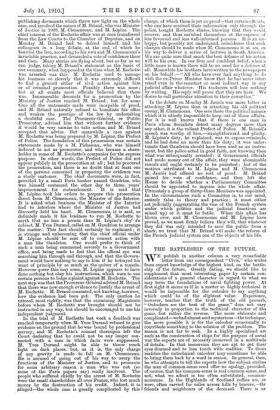THE ROCHETTE AFFAIR. T HOSE who have watched with sympathy and
admira- tion the efforts of M. Briand to save French Parlia- mentarism from sterility, to implant tolerance in French political life, and to make the title of " Republican " symbol of political productivity and beneficence, will .be sincerely sorry that thus early in his career as Prime Minister he should be faced with one of those affaires which frequently trouble the waters of French politics. These afaires are exciting and piquant, of course—many a cafe would be dull without them—but they are often poison, and if they are mismanaged may easily mean political death, to statesmen who deserve well of their country. The sympathy of most Englishmen with M. Briand will be all the stronger because they cannot help reflecting that French Ministers are often dragged into these affaires quite unnecessarily owing to the confusion of the executive and judicial functions. We have little doubt that M. Briand, who personally is implicated hardly at all, will come triumphantly out of the investigation, which is probably being pressed largely for political reasons. The main charges are against M. Clemencea,u and M. Lepine, the Prefect of Police, and it ought to be said at once that they are no more than charges. It may be that the politicians who are bringing these charges of illicit action against M. Clemenceau, who was Minister of the Interior in 1908, and M. Lepine, and in a minor degree against M. Briand as an assenting party, are sincere in what they say ; but we also venture to assert that in a country where the judicial and executive capacities are mingled. it is absolutely impossible for the most single-minded politician to know exactly where his desire for judicial propriety ends and his political animus begins. It is a question for casuists. The fatal thing is that statesmen should be at the mercy of such workings, beyond all human calculation, in the minds of their critics.
But what is this Rochette affair ? As we learn from the Times, M. Rochette, a Paris banker, was arrested in March, 1908, on a charge of embezzlement and of floating sham companies. His trial had been going on normally for several days last week when the newspapers began publishing documents which threw new light on the whole case, and involved the names of M. Briand, who was Minister of Justice in 1908, M. Clemenceau, and M. Lepine. The chief interest of the Rochette affair was at once transferred from the Law Courts to the Chamber of Deputies, and on Monday M. Briand had to defend himself and his colleagues in a long debate, at the end of which he bearded the lion, according to his own and M. Clemenceau's invariable practice, and demanded a vote of confidence there and then. Many stories are flying about, but so far as we can judge, taking M. Briand's statement as the basis of our summary, what happened at the time when M. Rochette was arrested was this. M. Rochette used to manage his business so cleverly that it was extremely difficult to find a ground either of civil action against him or of criminal prosecution. Possibly there was none ; but at all events most officials believed that there was. Innumerable demands for a prosecution by the Ministry of Justice reached M. Briand ; but for some time all the statements made were incapable of proof, and M. Briand naturally refused to humiliate his office and weaken the prestige of the law by undertaking a doubtful case. The Procureur-General, or Public Prosecutor, advised him that without further evidence it would be very unwise to take action, and M. Briand accepted that advice. But meanwhile a case against M. Rochette was being prepared by M. Lepine, the Prefect of Police. The foundation of this prosecution was certain statements made by a M. Pichereau, who was himself induced to act as prosecutor, and who became a share- holder in some of M. Rochette's companies for the express purpose. In other words, the Prefect of Police did not appear publicly in the prosecution at all ; but he procured the prosecution, and there is no doubt that at least one of the persons concerned in preparing the evidence was a shady customer. The chief documents were, in fact, provided by a small Paris banker named Gaudrion, who was himself sentenced the other day to three years' imprisonment for embezzlement. It is said that M. Lepine took his orders to prepare this prosecution direct from M. Clemenceau, the Minister of the Interior. It is asked what business the Minister of the Interior had to interfere where the Minister of Justice had discreetly held his hand. M. Clemenceau, it is said, so definitely made it his business to run M. Rochette to earth that no less a person than M. Lepine's Alf du cabinet, M. Yves Durand, called on M. Gaudrion to arrange the matter. This fact should certainly be explained ; it is strange and unbecoming that the chief official under M. Lepine should be sent off to concert action with a man like Gaudrion. One would prefer to think of such a man being summoned severely to a Government office, and being made to feel that the official eye was searching him through and through, and that the Govern- ment would have nothing to say to him if he betrayed his want of principle by so much as the quiver of a muscle. However queer this may seem, M. Lepine appears to have done nothing but obey his instructions, which were to use certain persons to lodge a plaint against M. Rochette. The next step was that the Procureur-General advised M. Briand that there was now enough evidence to justify the arrest of M. Rochette. M. Briand consented, not knowing, however, how the evidence had been got. The only caution he uttered, most rightly, was that the examining Magistrate before whom M. Rochette was brought should not be instructed in any way, but should be encouraged to use his independent judgment. In the trial of M. Rochette last week a deadlock was reached temporarily when M. Yves Durand refused to give evidence on the ground that he was bound by professional secrecy, and M. Rochette's counsel thereupon left the Court declaring that he could not be any longer con- nected with a case in which facts were suppressed. M. Yves Durand might be able to throw much light on dark places, but, as it is, the only charge of any gravity is made to fall on M. Clemenceau. He is accused of going out of his way to usurp the functions of the Minister of Justice, and to prosecute for some arbitrary reason a man who was not (so some of the Paris papers say) really insolvent. The people who suffered chiefly by the arrest of M. Rochette were the small shareholders all over France, who lost much money by the destruction of his credit. Indeed, it is p,lleged—the whole case is greatly complicated by this charge, of which there is yet no proof—that certain officials, who can have received their information only through the police, bought Rochette shares, knowing that they would recover, and thus enriched themselves at the expense of less favoured and less well-informed persons. It is an un- happy, but possibly not undesigned, coincidence that such charges should be made when M. Clemenceau is at sea on his way to deliver a series of lectures in South America. We are quite sure that much the best defence of his action will be his own. In our firm and confident belief, when a little more is known there will be no need for a defence at all. Meanwhile his brothers have written to the newspapers on his behalf :—" All who have ever had anything to do with the ex-Prime Minister know that he has never inter- vened even in the remotest or most indirect way in any judicial affair whatever. His traducers will lose nothing by waiting. His reply will prove that they are liars. We desire to call particular attention to their cowardice."
In the debate on Monday M. Jaures was more bitter in attacking M. Lepine than in attacking his old political enemy, M. Clemenceau. One sees there the political animus which it is utterly impossible to keep out of these affairs. For it is well known that if there is one man in Paris whom Socialists detest many degrees more than any other, it is the valiant Prefect of Police. M. Briand's speech was worthy of him,—straightforward and plucky. M. Lepine's duty, he explained, was to expose criminals, and he had done no more than his duty ; it was unfor- tunate that Gaudrion should have been used as an instru- ment, but the police acted in good faith, not knowing then what was subsequently revealed ; if Government officials had made money out of the affair, they were abominable rascals and ought certainly to be punished ; but of the motives attributed to M. Lepine and M. Clemenceau M. Jaures had offered no sort of proof. M. Briand gained his vote of confidence, and then left the House to decide whether a Parliamentary Committee should be appointed to inquire into the whole affair. Ultimately a group of thirty-three Members was appointed. In the circumstances such a Committee is, to our mind, entirely false in theory and practice ; it must either act judicially (aggravating the vice of the French system under which politics and the judicial functions are mixed. up) or it must be futile. When this affair has blown over, and M. Clemenceau and M. Lepine have proved, as we most firmly believe they will, that whatever they did was only intended to save the public from a shark, we trust that M. Briand will make the reform of the French judicial system one of the objects of his life.







































 Previous page
Previous page